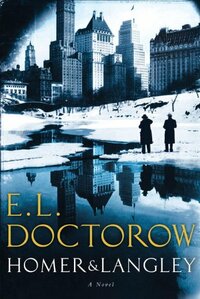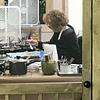Take a photo of a barcode or cover
Okay i love the writing but the story is depressing. It wasn't so bad at first but I'm really questioning what the heck are we really on this planet for?? the writing keeps me reading.
I so loved Ragtime by Doctorow but none of the subsequent books by him have had that same magic. I found much of Homer and Langley dull really. The Wiki page about the real life Collyer brothers was more interesting to me, frankly. Doctorow moves the story up a couple of decades too from the historical account for some reason. In novel, Homer, who went blind in his teens, is a musician and his older brother Langley allegedly cares for him, though Langley is not the same man since he returned from WWI with lungs scarred from having been gassed. Slowly the brothers become more and more estranged from the outside world, rarely leaving their brownstone mansion on Fifth Avenue in Manhattan. Langley has many crack pot ideas, most of which cause him to bring more and more things into the house and the found objects soon fill every crevice of the once grand mansion. The book seems to want to give some sort of panoramic sweep of U.S. history from the first half of the 20th century, but it didn’t quite manage that for me personally.
I've enjoyed what I've read of Doctorow's works, so I was excited to win a copy of his newest in a First Reads giveaway. Home and Langley is, from what I can tell, quintessential Doctorow style -- there's just something I can't articulate, but can immediately pin down as his writing. This new novel is told by Homer Collyer, an infamous, true-life resident of New York City.
Homer's quiet desperation becomes clear early on. He seems composed and put together, but underneath there is something struggling. There's turmoil. He's blind, he is orphaned in his teens, and his brother is half-mad due to WWI; through this all, he attempts to succinctly narrate the events that lead up to his and Langley's downward spiral. I didn't particularly like his narrative until Langley brings the Model T into the house. Before this point, the book seemed to be one long string of events. It was at the point of the Model T that I felt something akin to empathy and I began to feel a vested interest in these brothers' unified story. I think this is when I realized just how affected Langley was.
At one point in the story, Langley and Homer are intruded upon by FBI agents who have come for the brothers' Japanese housekeepers. After failing to secure safety for their employees, an enraged Langley asks Homer something along the lines of, "How can we be free if only at their sufferance?" And that to me is the essence of this entire novel. Be it the FBI, the press, the kids who throw rocks at the house, or the hippies who settle in for a while, Homer and Langley are never truly free to do their own thing. They are always at the mercy of others.
The final pages are heartbreaking and abrupt, as Homer becomes more and more isolated, not just from the outside world, but from everything he knows. The final passages resonate with that quiet desperation and longing for what he considers normal.
I'd recommend this to fans of literary/historical fiction. I wouldn't be surprised if others who read it are as curious about the real-life brothers as I am now.
Homer's quiet desperation becomes clear early on. He seems composed and put together, but underneath there is something struggling. There's turmoil. He's blind, he is orphaned in his teens, and his brother is half-mad due to WWI; through this all, he attempts to succinctly narrate the events that lead up to his and Langley's downward spiral. I didn't particularly like his narrative until Langley brings the Model T into the house. Before this point, the book seemed to be one long string of events. It was at the point of the Model T that I felt something akin to empathy and I began to feel a vested interest in these brothers' unified story. I think this is when I realized just how affected Langley was.
At one point in the story, Langley and Homer are intruded upon by FBI agents who have come for the brothers' Japanese housekeepers. After failing to secure safety for their employees, an enraged Langley asks Homer something along the lines of, "How can we be free if only at their sufferance?" And that to me is the essence of this entire novel. Be it the FBI, the press, the kids who throw rocks at the house, or the hippies who settle in for a while, Homer and Langley are never truly free to do their own thing. They are always at the mercy of others.
The final pages are heartbreaking and abrupt, as Homer becomes more and more isolated, not just from the outside world, but from everything he knows. The final passages resonate with that quiet desperation and longing for what he considers normal.
I'd recommend this to fans of literary/historical fiction. I wouldn't be surprised if others who read it are as curious about the real-life brothers as I am now.
First off, if anyone wants to make a TV series and needs source material, then please look into this book and the history of the Collyer brothers. I have to say that this book is my first example of postmodernism after being fully lectured on it. I have to say that after this book that I plan to read more works written by E.L. Doctorow. This book is an interesting narrative because it is told through the perspective of a blind person so the narration is totally unreliability, but we still go along with it. It just seems so interesting to see characters remain in stasis/equilibrium around their culture. I don't know if I am making any sense at all, but I love this book. Please let this become a Netflix original series.
Es un libro tierno, costumbrista, entrañable, pero, quizá porque no era mi momento y estoy desganada, me ha faltado algo.
https://twitter.com/BettieJander/status/795275529154924545
https://twitter.com/BettieJander/status/795275529154924545
"Our every act of opposition and assertion of our self-reliance, every instance of our creativity and resolute expression of our principle was in service of our ruination”
This is the story of two brothers, based on two real life brothers, Homer and Langley Collyer, and their lives from the affluent birth to their paranoia-fueled demise. The elder brother suffers from severe OCD while the other learns to navigate their ever increasing hoard without sight. I feel this book encapsulates both the freedoms and loneliness of a reclusive life, sometimes with shocking clarity. There were moment when Homer discussed their overflowing collection and I swear I could smell the mildewed papers and feel the claustrophobic atmosphere creep in around me. However, ever hopeful as Homer, I rejoiced on the occasions he was able to escape his life, even if it was just a stranger in the park. Slow to start, but almost impossible to put down, their lives are a walk through time. Though the real brothers passed away in the 1940s, their fictional counterparts have brief interludes with society during both World Wars, Prohibition, Vietnam, and the free love era.
This is the story of two brothers, based on two real life brothers, Homer and Langley Collyer, and their lives from the affluent birth to their paranoia-fueled demise. The elder brother suffers from severe OCD while the other learns to navigate their ever increasing hoard without sight. I feel this book encapsulates both the freedoms and loneliness of a reclusive life, sometimes with shocking clarity. There were moment when Homer discussed their overflowing collection and I swear I could smell the mildewed papers and feel the claustrophobic atmosphere creep in around me. However, ever hopeful as Homer, I rejoiced on the occasions he was able to escape his life, even if it was just a stranger in the park. Slow to start, but almost impossible to put down, their lives are a walk through time. Though the real brothers passed away in the 1940s, their fictional counterparts have brief interludes with society during both World Wars, Prohibition, Vietnam, and the free love era.
I found this book beautiful and moving. The writing carried me along and maintained a mood of thoughtfulness. It’s told with caring and sensitivity, truly detailing how we can all slip into a customized way of life that sustains us. It can look lonely and absurd to others but might be our best life. Maybe it falls short but we’re so invested, so wrapped in our comforts, that other options don’t seem possible. The true story of the brothers is fascinating as well.






